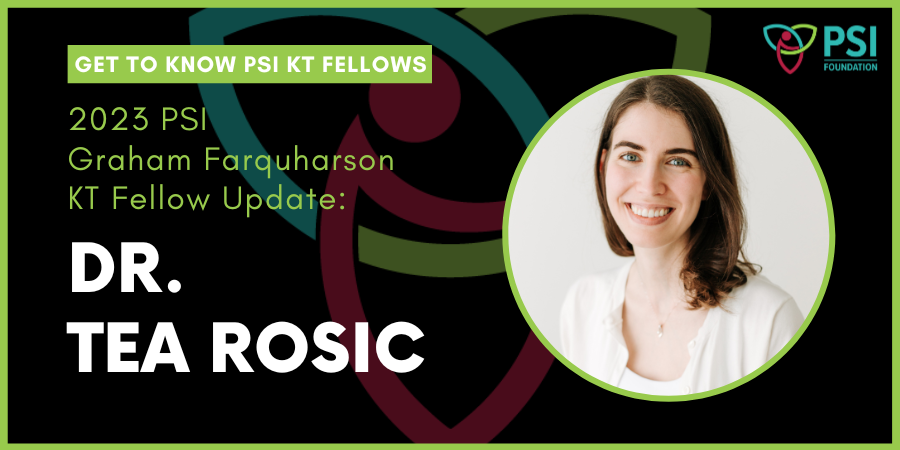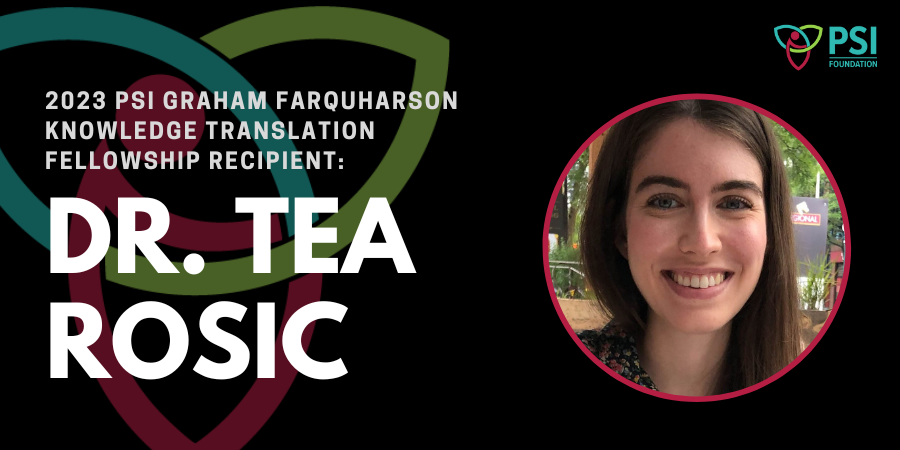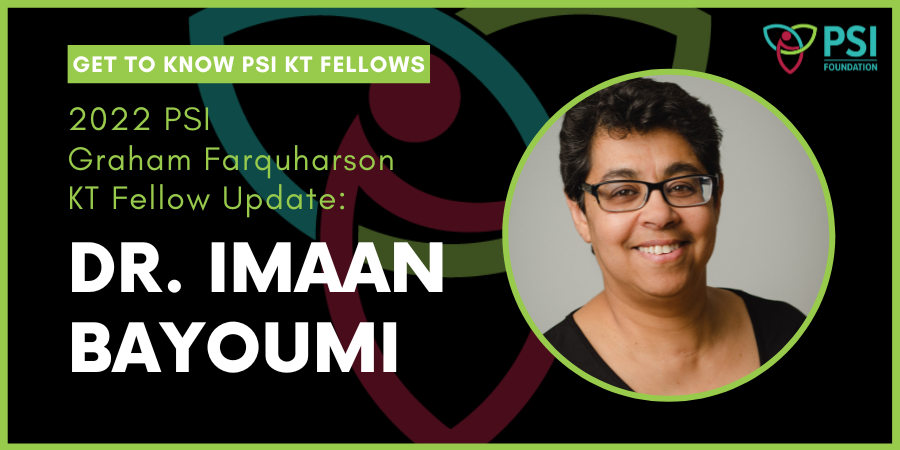Once our PSI Knowledge Translation (KT) Fellows take off from the starting line, they make strides as they move their knowledge translation activities and research program forward. As the finish line becomes clearer in their sight, we asked our fellows some questions to share their progress thus far, and what they look forward to in the remainder of their KT Fellowship.
What are some of your accomplishments from the KT Fellowship thus far?
The PSI Graham Farquharson KT Fellowship has afforded me numerous opportunities to pursue my own program of knowledge translation work and collaborate with mentors and colleagues on new projects. My clinical work and research focus on adolescent substance use and co-occurring mental health disorders (“concurrent disorders”). I use clinical and health services research methods to understand the development, impact, and treatment of concurrent disorders in this population.
During my KT Fellowship, I am (1) working with community organizations in Ontario to identify needs and gaps in services and build capacity for adolescent concurrent disorders care, (2) developing a specialized child Substance Use and Concurrent Disorders program at the Children’s Hospital of Eastern Ontario (CHEO), and (3) contributing to national standards development and implementation for paediatric concurrent disorders.
My program of KT under this fellowship began with a study to develop a framework outlining the components of child and youth concurrent disorders programs that has been published in the Canadian Journal of Psychiatry (Rosic et al., 2024). My team then collaborated with community partners to conduct a community-based needs assessment to identify gaps in care for child and adolescent substance use and concurrent disorders in Eastern Ontario. We recently presented our findings at the Children’s Healthcare Canada annual conference in April 2025. With the goal of knowledge mobilization, I have led several presentations on paediatric concurrent disorders care locally and provincially within the Ontario Telemental Health Network. I have also collaborated with the Knowledge Institute on Child and Youth Mental Health and Addictions (the Knowledge Institute) to develop a resource for healthcare professionals on paediatric concurrent disorders care, under the mentorship of my KT Fellowship mentor, Dr. Amy Porath, Director of Research and Knowledge Mobilization at the Knowledge Institute.
This year, in partnership with Kids Come First and CHEO, and funded by Health Canada, we are launching a clinical program to expand substance use screening, brief intervention and referral to treatment, housed in the Substance Use and Concurrent Disorders program at CHEO. Relatedly, we are conducting a study to examine the prevalence of concurrent disorders in youth accessing centralized mental health intake in collaboration with the Knowledge Institute and Kids Come First. Finally, to advance national standards implementation for youth concurrent disorders, I am leading a study examining the uptake of guidelines on assessment and treatment of nicotine vaping in hospital-based child and youth mental health programs across Canada. Protected time to engage in KT and research has been invaluable and access to a network of collaborators spurred by mentorship I am receiving during my KT Fellowship has led to these exciting opportunities.
What are some items/deliverables that you look forward to coming to fruition in the remainder of your KT Fellowship?
Over the next two years of my KT Fellowship, I look forward to ongoing collaboration with the Knowledge Institute that will result in knowledge products on service and system mapping in Ontario for child and youth concurrent disorders care. Additionally, we will launch our expanded Substance Use and Concurrent Disorders service at CHEO in July, filling key gaps in the continuum of care with community programs. Numerous KT activities will come from this work in order to disseminate knowledge within the broader clinical and scientific communities.
What are some things that surprised you during your fellowship thus far?
Most eye-opening has been the critical impact of mentorship in KT. As physicians and scientists, we receive most of our training in clinical care and primary research methods but often less training, or certainly less formal training, on knowledge mobilization. There are many skills required to engage in knowledge translation that effects change. As clinicians, we intuitively know the importance of research to improve our clinical care, yet there is often a gap in our ability to mobilize the knowledge to bring about necessary change and engage with relevant knowledge users and champions. I have been pleasantly surprised by the seemingly endless new opportunities to engage in KT related to my area of research, above and beyond what I initially sought out to do in my KT Fellowship. The mentorship I am receiving on KT from Dr. Porath has been key to this.



